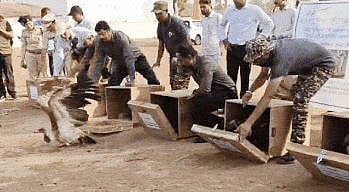**Van Vihar National Park Adopts Phased Soft Release Strategy for Vultures**
*Bhopal (Madhya Pradesh):* After experiencing setbacks earlier this year, Van Vihar National Park is gearing up to release captive-bred vultures into the wild once again—this time employing a carefully planned, phased soft release strategy.
In April 2025, six captive-bred vultures were released near Halali Dam, but unfortunately, three of them died shortly after. Officials identified that the direct release method had led to the birds’ inability to adapt to their natural environment and locate food sources. Learning from this, the park’s authorities have revamped their strategy to increase the chances of survival.
**A Methodical Soft Release Approach**
The new plan involves initially placing the vultures inside a specially designed enclosure located within a forested area. This setup will help the birds acclimatize to natural surroundings and develop critical survival behaviors before they are fully released into the wild.
An officer from Van Vihar National Park explained that the enclosure will mimic wild-like conditions, featuring hills and natural terrain. Inside, the vultures will be provided with carcasses, enabling them to foster scavenging habits essential for their survival post-release.
**Enclosure Preparation and Location**
The first step is to prepare a secure enclosure within forested land that prevents premature escape, allowing the vultures a structured adaptation period. Although the final location is yet to be confirmed, officials are exploring options beyond the Halali Dam area, including the Gandhi Sagar Sanctuary in Mandsaur.
Vultures will remain within the enclosure until they demonstrate the ability to live independently. Only then will they be gradually released into the open wilderness, typically in small groups, to ensure better adaptation and increased survival chances.
**Tracking Vultures Using GPS Technology**
Van Vihar Director Vijay Kumar shared that a detailed Standard Operating Procedure (SOP) is currently being finalized to guide the soft release process. A formal proposal has been submitted to the Central Zoo Authority (CZA), and once approval is received, the phased release will commence.
Each vulture will be fitted with a GPS-GSM tracking tag that will allow officials to monitor their movements, health, and survival during both the enclosure phase and after release into the wild. This technology is expected to provide vital data and enable quick interventions if any issues arise.
**Kerwa Centre Breeding Endangered Vulture Species**
The vultures prepared for release are part of a long-term captive breeding program at the Vulture Conservation Centre in Kerwa, which currently shelters 92 birds. The population includes two endangered species—Long-billed Vultures and White-rumped Vultures—both of which play a critical ecological role by disposing of carcasses naturally.
Officials emphasize the importance of this careful release methodology, as these birds represent a crucial population in efforts to reverse the declining vulture numbers across central India.
**Reflecting on Past Challenges**
The earlier direct release attempt in April resulted in the loss of half the birds within weeks. Observations indicated that the released vultures struggled to adapt to the wild, particularly with finding and scavenging food. This experience highlighted the need for a more supportive, gradual transition approach to improve survival rates.
—
The revamped phased soft release strategy by Van Vihar National Park is seen as a significant step forward in vulture conservation, combining scientific methods and modern technology to safeguard these important scavengers and restore ecological balance.
https://www.freepressjournal.in/bhopal/bhopal-news-van-vihar-opts-for-cautious-vulture-release-after-failed-attempt
